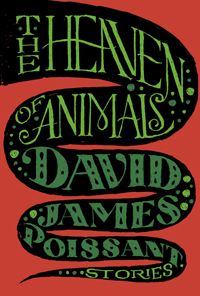Scared and Ashamed and Full of Hope
In The Heaven of Animals, David James Poissant limns the lives of the thwarted
“There’re those who look and those who don’t,” writes David James Poissant in The Heaven of Animals. “And then there’re those who look too much. Like: Look, I’m so comfortable, I can stare right at it.” The “it” in question is a teenaged girl’s prosthetic arm. But it might also be the familiar sense of longing and loss that marks the thwarted lives of Poissant’s characters. Following in the tradition of Raymond Carver and Richard Ford, Poissant has delivered a subtle, serious, haunting collection of tales in which hard-luck cases navigate the bleak landscape of contemporary America in search of atonement.
 While Ford and Carver are the handiest influences to offer up for comparison, many of these striking tales are reminiscent of older voices. Sherwood Anderson comes quickly to mind, thanks to Poissant’s preference for studying the lives of outwardly unremarkable people and his penchant for utilizing quirky, memorable conceits around which to build his protagonists’ journeys toward epiphany.
While Ford and Carver are the handiest influences to offer up for comparison, many of these striking tales are reminiscent of older voices. Sherwood Anderson comes quickly to mind, thanks to Poissant’s preference for studying the lives of outwardly unremarkable people and his penchant for utilizing quirky, memorable conceits around which to build his protagonists’ journeys toward epiphany.
In “Lizard Man,” Dan, a short order cook and recovering alcoholic, journeys with his neighbor Cam to settle the estate of Cam’s estranged father. Upon arriving at the house, the men discover a pet alligator in a backyard pool, abandoned after the death of Cam’s father. A faintly comic rescue attempt ensues, juxtaposed with flashbacks revealing how Dan lost his own family in an ill-fated explosion of alcoholic rage. Cam’s quest to achieve closure on his troubled relationship with his father by releasing the alligator into the Florida swamp also becomes a vehicle for Dan’s discovery of his need for redemption:
He is swift and strong, and I’m glad it is cold and raining so Cam can’t see the tears streaking my cheeks and won’t know that my shivering is from sobbing. Cam lets go of me and I think I will fall, but instead I am running. Running! And I’m laughing and hollering and leaping. I’m pumping my fist into the air. I’m screaming, “Go! Go!” And just before the alligator reaches the water, I lunge and my fingertips trace the last ridges and scales of tail whipping their way ahead of me.
 Of course, no story written by a Southerner that includes a prosthesis can avoid comparison to Flannery O’Connor’s “Good Country People.” Lily, the one-armed girl in “Amputee,” appears first as a siren-like seductress, offering herself up to Brig, a sad-sack pharmaceutical salesman and lapsed Mormon transplanted to Arizona after the end of his marriage. But Poissant reverses O’Connor’s scenario by having the salesman receive the necessary moment of grace: the seductress turns out to be an innocent—a victim of tragedy desperately in need of human contact. When Lily disappears, Brig is left to ponder his predicament—and arrive at his own epiphany: “If you hoped hard enough, you could wish a thing into existence. He’d believed that, once. He wanted to believe it again. Eyes closed, hoping—it was as close as he could get to prayer.”
Of course, no story written by a Southerner that includes a prosthesis can avoid comparison to Flannery O’Connor’s “Good Country People.” Lily, the one-armed girl in “Amputee,” appears first as a siren-like seductress, offering herself up to Brig, a sad-sack pharmaceutical salesman and lapsed Mormon transplanted to Arizona after the end of his marriage. But Poissant reverses O’Connor’s scenario by having the salesman receive the necessary moment of grace: the seductress turns out to be an innocent—a victim of tragedy desperately in need of human contact. When Lily disappears, Brig is left to ponder his predicament—and arrive at his own epiphany: “If you hoped hard enough, you could wish a thing into existence. He’d believed that, once. He wanted to believe it again. Eyes closed, hoping—it was as close as he could get to prayer.”
Most of the stories follow a familiar template: hardscrabble, down-on-their-luck characters confronted with curious, unusual circumstances, often involving animals, which provoke sudden realizations—sometimes tragic, sometimes hopeful, and sometimes both at once. There’s the alligator of “Lizard Man,” a missing cat in “Amputee,” a charging bison in “Last of the Great Land Mammals,” and in “What the Wolf Wants,” there’s… .You get the picture.
In “The End of Aaron,” a young woman describes her schizophrenic boyfriend’s perilous veering between madness and clarity; an allergy to bees becomes the proverbial Chekhov’s gun, foretelling a tragic conclusion. In “The Geometry of Despair,” a couple grappling with the loss of an infant child are confronted with a small herd of deer in their yard, provoking another heartfelt reckoning: “The deer run to the edge of our yard and into the thicket. Lisa falls away from the window and slips to the floor. Sitting with her back to the wall, she looks up at me and her face is wet. I feel like I’m meeting her eyes for the first time since the funeral, and I am scared and ashamed and full of hope.”
The device of having animals serve as vehicles for human discovery would likely seem cloying and contrived in less able hands. David James Poissant’s gifts as a stylist lift these tales above the surface of their formula, and his emotional honesty gives them real weight and heft. He demonstrates this gift most ably in the collection’s last story, “The Heaven of Animals,” which reintroduces Dan, the protagonist of “Lizard Man,” as he journeys cross-country for a final reunion with his adult son, who is dying of AIDS complications. Along the journey, Dan must come to terms with both the tragic futility of life and the need to go on living: “It was a miracle, a horror—the world, and his son gone, blinked from existence. Jack dead, and still beans would be dried and crushed, strained through water, and men and women would raise their mugs and read the day’s news and make grocery lists and worry over coupons and wonder whether their tires were in need of rotation.”
The lessons learned in these stories are not easy ones. The world of The Heaven of Animals is as cruel and unforgiving as the one we live in. The consolations they offer come in the form of a compassion for the misbegotten that makes this fine debut as endearing as it is memorable.

Ed Tarkington holds a B.A. from Furman University, an M.A. from the University of Virginia, and a Ph.D. from the creative-writing program at Florida State University. His debut novel, Only Love Can Break Your Heart, is forthcoming from Algonquin Books. He lives in Nashville.


